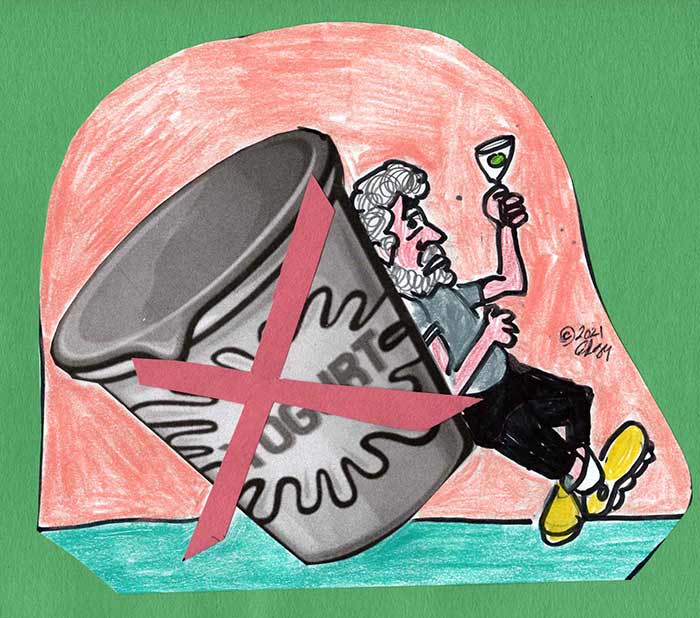What Is Cancel Culture?—An Irrational Discussion
Why some institutions could go broke going “woke”
By Ed Goldman
I’ll admit that when I first heard the term “cancel culture,” I thought it was a government edict for me to cancel my membership in the Yogurt of the Month Club.
What it actually means is possibly stupider.
Cancel Culture Club
Cancel Culture is an expression destined to be irrelevant in the next several months, along with “woke” and, one can only hope, “Ted Cruz.” It means you can ignore the testimony of your own senses—that if you wish something bad never happened or isn’t currently happening, poof! It never did and isn’t.
Some of the idiotic forms this phenomenon takes is revising Mark Twain’s greatest novel, “The Adventures of Huckleberry Finn,” to eliminate the racist sobriquet applied to the name of the former slave, Jim. Twain’s book is actually a study in humanity and humility—Jim’s unfortunate nickname (the N word, in case I’m being too coy or cautious) was a reality of the time and geography (the Old South) of the work, not a convenient adjective for the author.
Other more recent headline-grabbing stunts have included pulling down, rather than just relocating, statues of General Robert E. Lee of the Confederate States of America—a racist and in the final analysis, probably not that terrific a military leader—as well as Father Junipero Serra, who had a tendency to enslave people as he was establishing missions where, ironically, people go to learn about treating people the way Jesus would have, with respect and dignity.
To be sure, I applaud the effort of shelving stereotypes, like the names and icons of teams like the Atlanta Braves and the Cleveland Indians. But there’s a difference between renaming and rebranding sports clubs and pretending the original names and disturbing logos never existed. That’s cancel culture.
Here I need to bring up John Sutter, viewed in my city and region of Sacramento as a great leader, pioneer and forward thinker. The native Swiss also exploited and enslaved Native Americans. Nevertheless, one of the country’s largest medical institutions, based here, is named Sutter Health. There’s a historic fort in the heart of this city named for Sutter. There’s also Sutter’s Mill, Sutter’s Landing, Sutterville Road, and Sutter Middle School.
In the case of Sutter, cancel culture would exact an expensive toll: we’d have to reprint tons of stationary, redesign wayfinding systems, freeway signs, even sweatshirts. A statue of him in front of Sutter Medical Center was torn down a year ago.
I happen to belong to The Sutter Club, a private institution in downtown Sacramento founded in January 1889. A longtime gentlemen’s club, it adapted to the times marching past it, going co-ed in the latter part of the 1980s. But when I was first invited there for lunch in October 1976, shortly after starting my job in the Sacramento city manager’s office, I looked around its attractive grill room and noticed there were perhaps two women there, at tables filled with men. I asked my host, a banker, if women simply didn’t like the club’s distinctively masculine ambiance—there were no moose heads bursting through the walls but there seemed to be an emphasis on dark colors, heavy wood paneling and in the club bar we’d stopped into before lunch, many bottles filled with brown alcohol.
He shook his head, smiled indulgently at this 26-year-old punk from Southern California he’d perhaps unwisely invited to share a meal and said that women weren’t allowed to join. In my last valiant act, I took the linen napkin off my lap, put it on the table and stood to leave.
“Where are you going?” my host asked.
“They’re expecting me back in the current century,” I said, thinking I heard the imaginary movie audience that often accompanies me burst into spontaneous applause.
By the time I walked the few blocks back to City Hall, the banker had stepped into a phone booth at the club (cellphones were many years away) and called my boss, telling him (according to my boss), “You’re going to have some trouble with that young man.”
Throughout the next nearly five years, my boss did indeed have trouble with me. He even proposed I be laid off as a budget-cutting move in 1979 but a city councilman leapt to my defense at a meeting (literally; I thought the chairs on the council dais might have been spring-loaded). He also tried a few disciplinary moves which didn’t take. But I have to say, with retrospective gratitude, he never tried to cancel my culture.
Big news! Clinique is now on Amazon.
The #1 dermatologist guided skincare and makeup brand is on Amazon Premium Beauty for the first time. Shop trusted formulas across skincare, makeup, fragrance, and men’s products.
Ed Goldman's column appears almost every Monday, Wednesday and Friday. A former daily columnist for the Sacramento Business Journal, as well as monthly columnist for Sacramento Magazine and Comstock’s Business Magazine, he’s the author of five books, two plays and one musical (so far).













